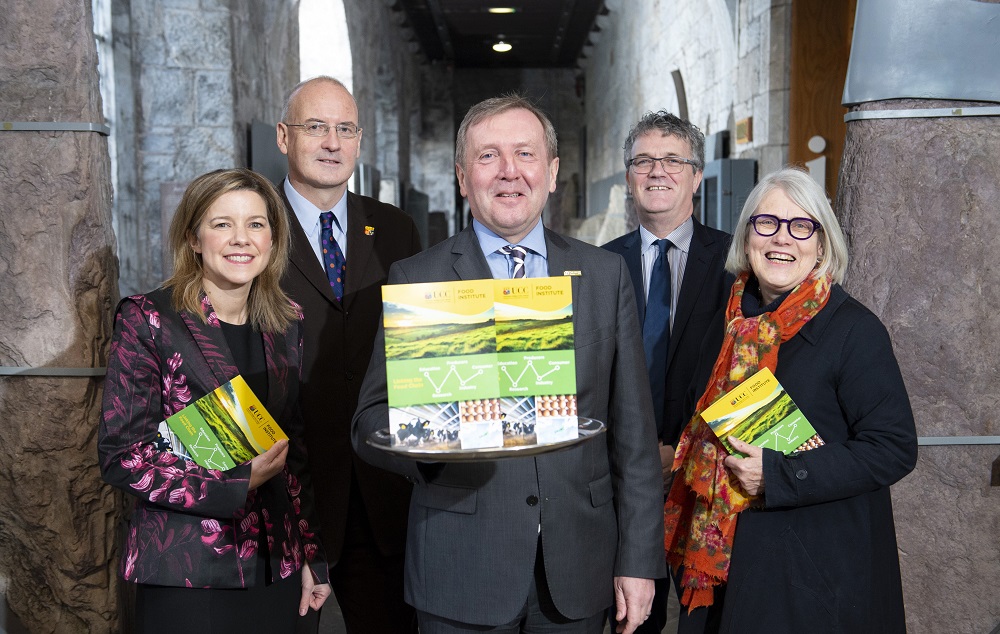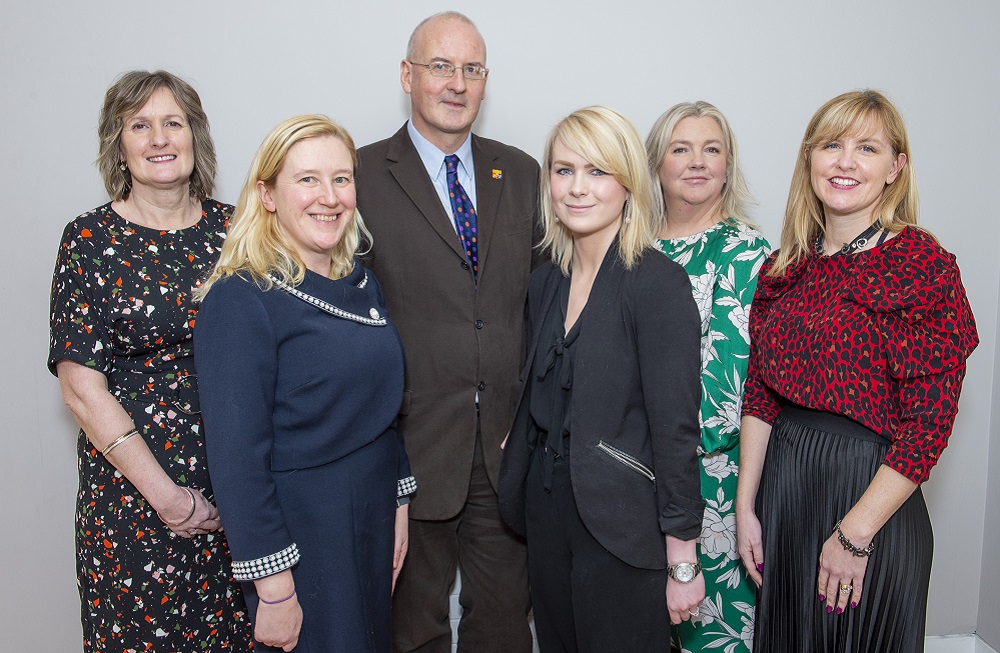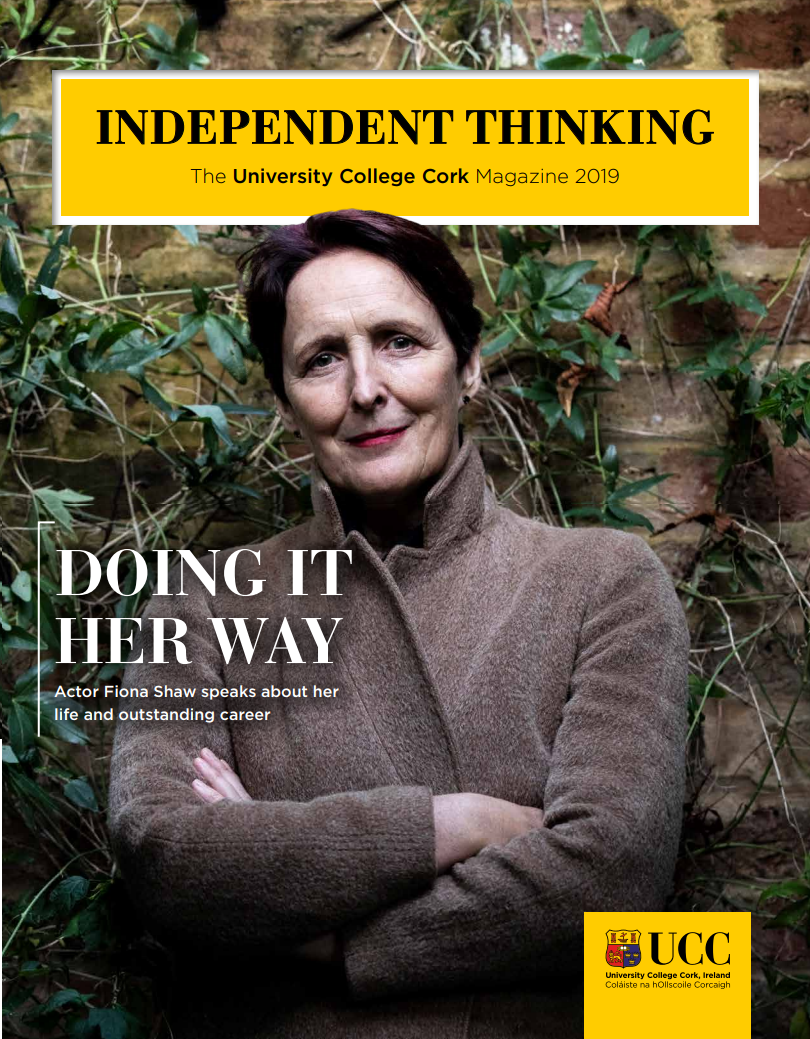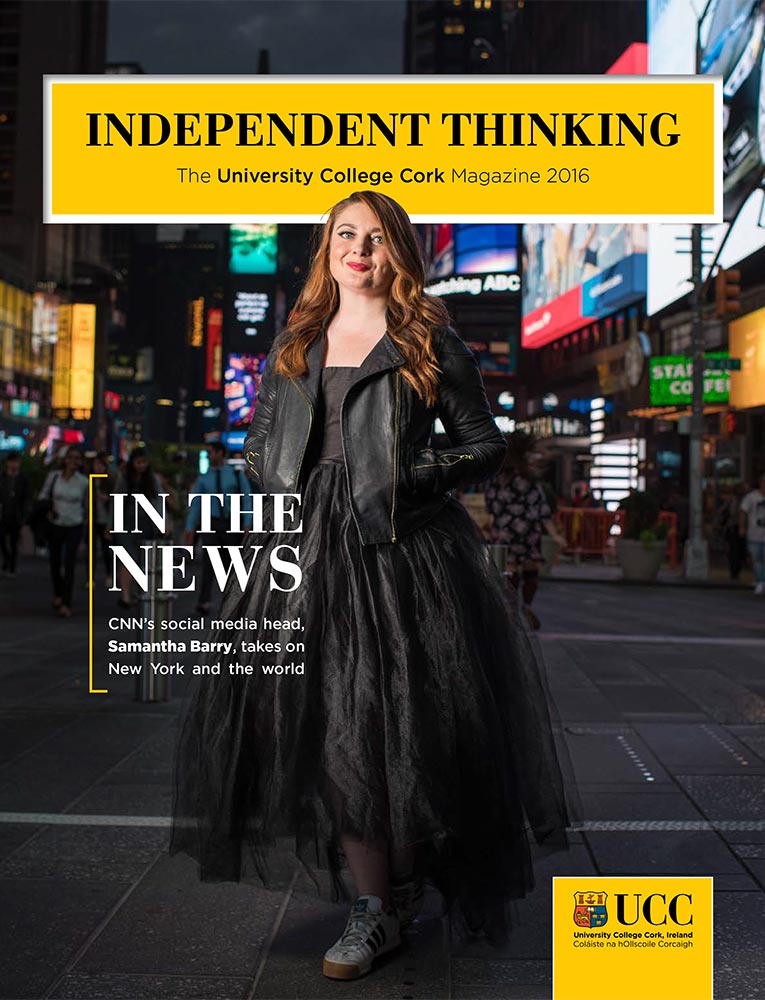Features
- UCC Springboard+: Kieran Egan
- UCC’s new Hub serves as ‘one-stop-shop’ service for 26,000 students
- Interview: Ryan Tubridy chats politics, history and his love of the arts on UCC visit
- UCC Emergency Care Society gets hands-on with life-saving skills
- Fitzgibbon Cup glory for UCC as hurlers beat IT Carlow in thrilling final
- GatewayUCC bridging the gap for research-entrepreneurs
- Pocket-sized brain injury monitor could be a game-changer for infant health
- Future of Irish hockey in safe hands with rising star Hannah
- Dr Eithne Hunt: Healthy habits for body and mind
- From Architecture to Web Development
- Nine APC Microbiome researchers make prestigious ‘highly cited’ list
- UCC honours five exceptional alumni at annual awards ceremony
- UCC spotlights four of its brightest up-and-coming female career scientists
- Rich Ferrie leads an exciting new era for UCC Innovation
- UCC honours its graduates with the official naming of the Alumni Bridge
- New UCC series explains how university research impacts daily life
- UCC's rising sports stars presented with scholarships
- UCC ranked among top universities in Europe for teaching excellence
Times Higher Education Europe Teaching Rankings 2019
- UCC makes Green Flag history…again!
The first university in the world to be awarded a fourth Green Flag
- Blazing a trail
Professor Helen Whelton charts her path to success, from curious dentistry student to global award-winner
- A Summer’s Evening on the Quad hits the right note for Cork charities
The fundraising event is now in its 14th year
- A curious mind
Paul Ross on his love of science, his greatest moments of discovery, and the exciting next chapter at APC Microbiome Ireland
- Mind your microbiome: 9 ways to boost your gut health
In honour of World Microbiome Day
- UCC hosts top wind energy experts at Cork’s largest ever conference
Scientists and engineers gathered to discuss the future of renewable energy
- Lord David Puttnam makes a passionate case for careers in the arts
He features in the latest episode of UCC’s podcast, Plain Speaking
- Funding announced for UCC SFI Research Centres
- Beekeeping makes life sweeter for Cork kids
- Saving Ireland's seals with GPS
- UCC celebrates a stellar year in sport
- Tommy Fleming headlines A Summer's Evening on the Quad
Tickets available now
- UCC ranked as global leader for sustainable social and economic impact
Times Higher Education University Impact Rankings
- Former UCC President Michael Murphy becomes first ever Irish President of EUA
Professor Murphy served as UCC President for 10 years
- MaREI researcher returns from epic adventure in search of blue whales
Dr Ailbhe Kavanagh spent seven weeks in Antarctica
- Doireann Ní Ghríofa among six new members elected to Aosdána at UCC ceremony
Writer Doireann is a UCC alumna
- Former White House drug advisor goes 'inside America’s opioid crisis'
Keith Humphreys is the latest guest on UCC's official podcast, Plain Speaking
- UCC launches Sports Strategy
Pride on our chest, belief in our heart, sport in our bones.
- How Nicole Ryan is powering change after tragedy
Alex’s Adventure
- Brainwave ‘donation’ research offers promise for dementia treatment
Research and innovation
- Full-circle for Paul as UCC extends partnership with Cork City FC
A perfect match
- Praise for The Irish Revolution as 'Atlas' documentary airs on RTÉ
Atlas of the Irish Revolution
- Pastures new
UCC launches its Food Institute
- Making waves at MaREI
Ireland's National Ocean Test Facility opens
- Research spotlight: APC Microbiome Ireland
10 researchers among Highly Cited
- Spin-out success
Atlantia Food Clinical Trials expanding stateside
- Billy Morgan: Pride of Cork
Marking a decade of UCC Sigerson Cup football
- The future is bright for soccer's Captain Fantastic
Ciara McNamara
- The next phase for rugby's rising star
Jack O'Sullivan
- RTÉ to air 'Atlas' documentary
The next step for the Atlas of the Irish Revolution
- Top business talent share their secrets to success
CUBS Conference 2019
- Green roots and flying boots: Cork Chamber project showcases ‘future’ of Cork
Future Forms is part of Cork Chamber’s 200th anniversary celebrations
- CEO and camogie star Mary O'Connor is leading change for women in sport
Moving the goalposts
- Mary Robinson is the first guest on UCC’s new podcast
Plain Speaking is now available to stream
Pastures new
Jim Corbett explains why the time is right to launch UCC’s new Food Institute
In conversation with Jane Haynes

‘We aspire to be leaders in everything from the blade of grass in the field, to the synapse in the brain.’
This was the sentiment of President O’Shea as he contemplated the meaningful impact of UCC as a connected university, where the traditional silos of academia are broken down for fresh opportunities and ideas to thrive.
This idea of the power of connectivity and collaboration is at the foundation of UCC’s newly-launched Food Institute; an amalgamation of the university’s food-related activities and research.
“We’re essentially repackaging the current food offer within UCC,” explains Jim Corbett, Head of the Food Institute, “From food marketing and entrepreneurship; right through to food technologies, and nutrition and formulations; all the way across to basic research in food molecules.”
To understand the significance of the Food Institute in 2019, you need to reflect on UCC’s rich and historic legacy in food. UCC has always been an influencer in the Irish food landscape; UCC’s Food Science faculty was launched 90 years ago as Ireland’s first food research and learning institution.
As we face into politically and economically uncertain times, in a tech-dependent world where food security has become a key concern, Corbett explains that unifying UCC’s food activities and research under one entity has become essential to leveraging its ‘world-level competence’ in the sector.
"Our future lies in Europe, and UCC intends to play its role in that regard" - Jim Corbett
“The repackaging of UCC’s food-related offering involves a more consolidated approach to our activities and research, and a more defined relationship with the outside world – particularly industry, but also government agencies and other institutions,” explains Corbett.
“For many years it was a national effort, and the companies were small in scale compared to the global food players that are around now. But, following several decades of Irish economic growth, we have some fantastic Irish food companies that are now global in their reach, and working internationally.
“The future of our country as a world-class food producer and for UCC as a research institution has to be about interacting with European- and world-level organisations – not just Irish ones. That level of activity will be ramped up as part of our focus at the Food Institute.”
While the core activity of the Food Institute is working with the existing researchers in UCC’s facilities, there are some exciting new developments up-and-running. Among these is the introduction of the Bachelor in Agricultural Science course which, through UCC’s partnership with Teagasc, Moorepark (the National Dairy Research Centre), gives students practical experience on the farm from the first year.
“There were a number of emerging trends which UCC identified and felt were important,” Corbett says, reflecting on the course’s origins.
“A big part of the motivation for introducing the course is that food production and food research have become broader than just about food as a product. We are now aware, for instance, how the gut microbiome is highly influenced by food and related areas like animal health and welfare, and soil health.

“When you talk about food research and food production now, you have to look at it all the way from the soil to how the food not only satisfies our dietary requirements but also affects the gut microbiome, our nutrition and our wellbeing. We are now also more aware that humankind’s appetite for food needs to be produced in a sustainable way. We felt there was a gap; we needed to extend our reach in terms of research and education beyond the farm gate.”
Beyond the lecture theatre, meanwhile, the Food Institute is generating new activities in research and in support of small food producers and artisans.
Opening up channels of research communication internationally is also important, not only amid the uncertainty of Brexit but also in light of the prediction that the world’s population will almost double (to 10 billion) by 2050.
“The university has to make sure it stays relevant on an international scale, because we do not have a monopoly on good ideas here,” says Corbett. “That is the level at which the game is being played now. Our future lies in Europe, and certainly, UCC intends to play its role in that regard.”
For UCC alumnus Corbett, the launch of the Food Institute marks an exciting development in the university’s history; when a group of senior researchers, boosted by an already strong legacy, come together to create meaningful impact on the highest level yet.
“There is a strong body of colleagues here at UCC who are already working in many of these areas, but one of the most interesting aspects for me is getting them to interact and support each other as a team, both inside and outside the university,” he says.
“UCC will always have a stronger voice when we present ourselves as one entity, and that’s an important emphasis for the Food Institute.”
Follow this link for more information on the Food Institute.



